‘The Way Things Are Going, Biden Is Going to Lose On His Own’: An Interview With Jill Stein
The Green Party candidate on democracy, climate change, Ukraine, why Democrats need to scapegoat left-wing “spoilers” and that night in Moscow the media can’t seem to forget.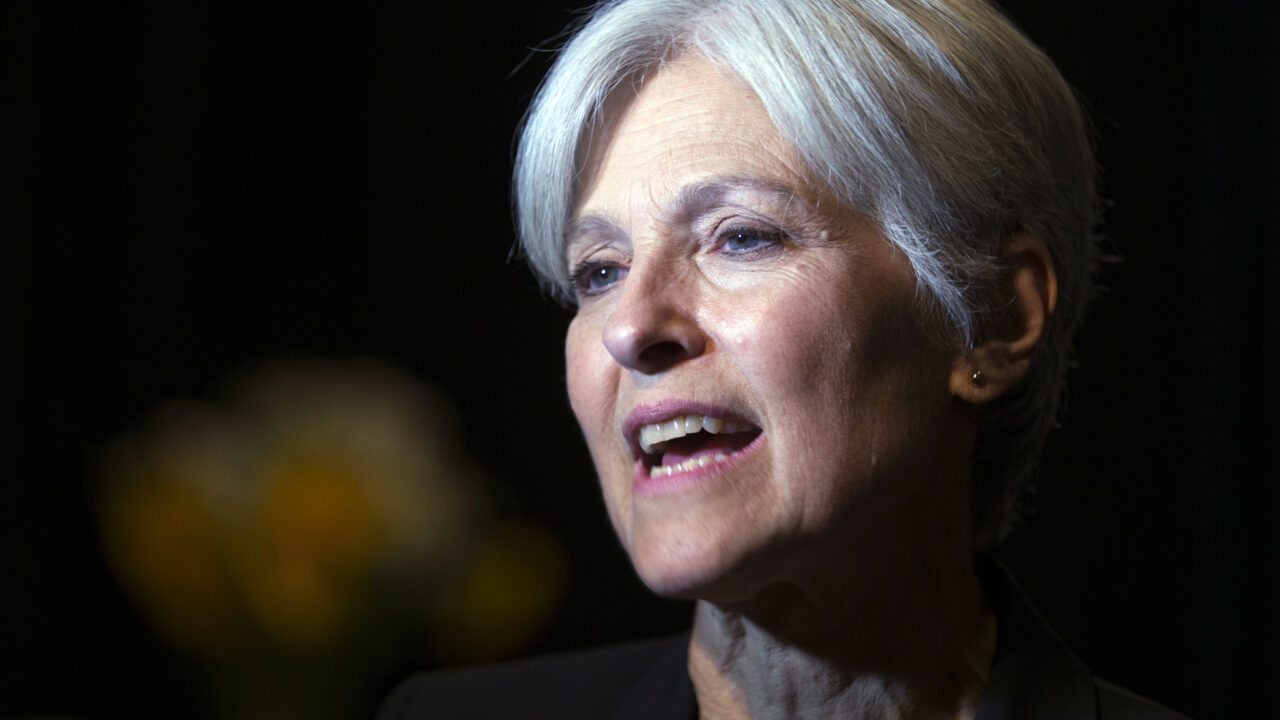 Green Party presidential candidate Jill Stein. (AP Photo/D. Ross Cameron, File)
Green Party presidential candidate Jill Stein. (AP Photo/D. Ross Cameron, File)
This is the third in Truthdig’s series of 2024 presidential candidate interviews. Conversations with Marianne Williamson and Dr. Cornel West can be found here and here.
When Cornel West announced in early October that he was leaving the Green Party to run as an independent, it was uncertain whether the country’s fourth largest political party would field a presidential candidate in 2024. A month later, 73-year-old Massachusetts physician, activist and party flagbearer Jill Stein announced she would lead the Green ticket for the third time since 2012, when she campaigned on “A Green New Deal for America.” Her 469,000 votes that cycle was the most received by the Green Party since Ralph Nader’s three million votes in 2000, and the most ever by a female candidate for the U.S. presidency. That campaign boosted Stein’s profile as well as the idea of a Green New Deal, seven years before Democrats Alexandria Ocasio-Cortez and Ed Markey introduced a bill of the same name that reframed climate action as a matter of jobs and justice as well as energy policy and ecological urgency.
Stein’s 2012 campaign was regarded as a nonfactor in Barack Obama’s reelection and largely ignored by the Democratic establishment. Her 2016 campaign drew considerably more attention — and ire — when she amassed vote totals in Pennsylvania, Wisconsin and Michigan that were larger than Donald Trump’s slim margins over Hillary Clinton. The three states did not equal enough electoral votes to swing the election, but many high-profile Democrats blamed Stein for “spoiling” the election, much as they had blamed Nader for Al Gore’s loss of Florida in 2000. As Stein notes in the following interview, this critique is a convenient way of ignoring the much larger movement of Democrats to the right: Seven million formerly reliable Democratic voters shifted to Trump in 2016, while pre-election and national exit polls suggest that most of Stein’s million-plus supporters would have stayed home had she not been on the ballot.
Amid aggressive Green Party canvassing to secure ballot access in 50 states, Stein is facing preemptive accusations of “spoiling” another election by providing what she calls a “pro-worker, anti-war, climate-action option for the people outside of the failed two-party system.” The following transcript has been edited slightly for clarity and length.
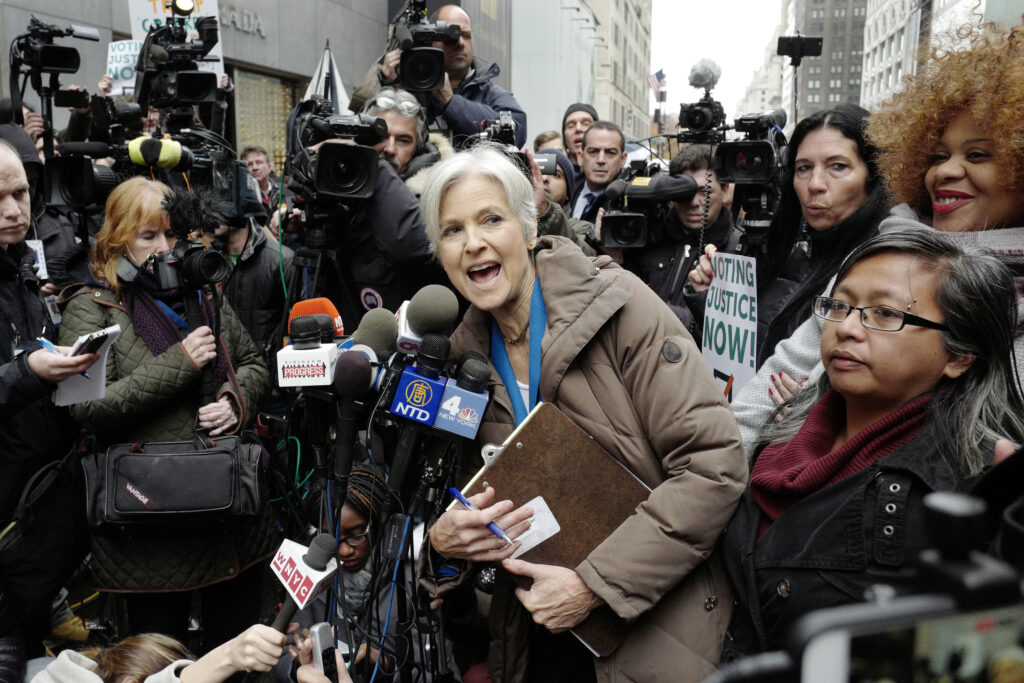
TRUTHDIG: Let’s start with the current political mood and situation. Trump is leading his challengers and Biden in the polls. Democrats are nervous and looking anxiously to the courts. Meanwhile, a lot of usual suspects are issuing the perennial warnings about third party candidates. Dick Gephardt, after two decades working as a lobbyist, has popped up as the face of a new group, Citizens to Save Our Republic, that is buying ads across the country to caution voters against the siren songs of third-party campaigns — or they will help elect Trump. There are similar rumblings on the left, including in quarters that believe Democrats should win or lose on their own merits. What do you say to those who are otherwise receptive and sympathetic to the Green Party platform and critique, but also believe conditions demand a united front behind the Democrat, given the unique threat they believe a second Trump administration poses to the remaining institutions and norms of what passes for American democracy, as degraded as they may be?
JILL STEIN: The way it’s going, Biden is going to lose on his own, even without third parties. The fact that we are being smeared and targeted reflects the Democrats’ vulnerability and failure to address their loss of support. It’s a fallacy that Greens and other progressive candidates take votes away from Democrats. Largely what we’re doing is bringing people out. In 2016, we received 1.4 million votes, but seven million Democratic votes crossed over for Trump. The bigger problem was the 100 million voters who didn’t come out at all. Marginalized constituents, youth, the poor. That’s who the Democrats ought to be talking to. That’s who’s being left out here. The argument that we’re spoiling the election is extremely disingenuous as well as anti-democratic.
TD: It’s also one that could be eliminated by rank-choice voting.
JS: Yes, it could. But what do the Democrats do? They fight rank-choice voting tooth and nail.
TD: Do you agree with the assessment that Trump represents a unique threat this time around? Does the lesser-of-two-evils argument carry more power than usual in 2024?
JS: I think the Democrats also pose very serious threats to democracy, including throwing competition off the ballot. That’s pretty authoritarian right there. They have their own way of undermining the integrity of our elections. They hijack their own primaries. They don’t even make a pretense. Democrats are leading the charge in the attack on free speech, freedom of the press, the right to protest. Democratic administrations accuse environmental protesters of terrorism and threaten them with decades in jail. The Republicans don’t have a stranglehold on threats to our democracy. The Democrats are also leading us into very dangerous wars that could turn nuclear quickly. I don’t think that’s less of a threat to the survival of our democracy.
TD: We’ll get to those wars in a minute. How do you assess the difference between the major parties on, say, climate and energy?
JS: If you look behind the numbers, the high-ground claimed by the Democrats is dubious. Biden is proceeding full speed ahead with 22 Liquified Natural Gas export facilities. Just one of them, in Louisiana, represents something like 20 times more CO2 than the Willow oil project in the Alaskan Arctic. The amount of carbon associated with these plants is off the charts. But those numbers are conveniently taken off the books so they don’t count in our country’s carbon footprint. If you include them, we have made zero progress since 2005. Nature doesn’t care about renewable energy if carbon is still being produced. That’s why we urgently need a Global Green New Deal.
TD: You’ve talked about how a Global Green New Deal was the centerpiece of your trip to Moscow in December of 2015. Because that event still gets invoked in a superficial way, I’m curious about the backstory and politics of that trip, and especially the Russia Today dinner that your critics love to trot out as some kind of “gotcha” moment.
The whole premise of the “Putin puppet” smear was always ludicrous, but they’re still using it, even after the Senate Intelligence Committee laid it to rest.
JS: The visit to Moscow was part of a longer trip that included the Climate Summit in Paris, where I met with Jeremy Corbyn, China’s deputy lead negotiator on climate, and grassroots activists from around the world. Putin had just begun bombing Syria at the time, and my message to him was that they were following the disastrous U.S. approach to the Middle East. The day of the dinner, I delivered a speech at a conference in Moscow about the need for U.S.-Russia collaboration on climate change, ending the scourge of nuclear weapons and ending the war in the Middle East. I was putting out a peace proposal.
TD: Sounds like standard two-track peace diplomacy.
JS: Yes. My interest in this [type of diplomacy] began when I was a pre-med student in Boston. My adviser brought me to a meeting of International Physicians for the Prevention of Nuclear War and I was just fascinated by it. I met visiting Russian scientists and I thought it was amazing and powerful and wonderful. Ordinary people, using their expertise, working to overcome the danger and the threat of nuclear war. A little later, Physicians for Social Responsibility was awarded the Nobel Peace Prize for their work around nuclear arms treaties. That model was very much on my mind when I decided to go to Russia. Contact between everyday people can help push the envelope.
TD: Together with the doctor and physicist groups, Mr. Rogers also went to Moscow during the Cold War. But you were branded a little differently.
The accusation that I was a “Putin puppet” ramified all the way up to a Senate Intelligence Committee investigation. It went on for years, cost hundreds of thousands of dollars. What the Committee came up with was a big “Thank you so much for your full cooperation.” They concluded there was nothing untoward or inappropriate whatsoever. The whole thing was completely above board and transparent from the get-go. We announced what we would be doing, how we were paying for it, who we planned to meet with. Our objectives were to advocate for a nuclear-weapons ban and a Global Green New Deal. The whole premise of the “Putin puppet” smear was always ludicrous, but they’re still using it, even after the Senate Intelligence Committee laid it to rest.
TD: Before we leave the subject, what was the chit chat like at the table? In pictures, everyone looks a little stiff and awkward.
It was awkward because the only English speaker within earshot of me was Willy Wimmer, a Defense Ministry official in the German government at the time of German reunification, who later became vice president of the Organization for Security and Cooperation in Europe. Putin walked in with these three strapping muscular guys and sat down for maybe 10 or 15 minutes. There was zero contact. There were some really interesting people in the room, including Gorbachev, entirely on the peace side of the equation. When I saw Michael Flynn, who wasn’t yet associated with the Trump campaign, I wondered, “What’s this weird military guy doing here?” I gave him my elevator speech about peace and the climate, and he did not relate in the least. That conversation was over in 60 seconds. It wasn’t my ideal meal because I’m a vegetarian and don’t drink, so I just picked around the margins. But the entertainment was excellent. The Russian military chorus was amazing.
TD: The Russian military chorus seems a good segue to the situation in Ukraine, which at the time of the dinner was still simmering. Going back further, the conflict arguably tracks to the first round of NATO expansion in 1998, around the time the Green Party began getting organized in the U.S.
JS: Let’s go back farther. In 1991, The New York Times published leaks from the Pentagon, possibly intentional, that amounted to the first declaration of what’s now known as “full-spectrum dominance” — the idea that Washington will not allow any power to rise, even reasonably, to command the resources of any region, let alone become a global competitor. At that point, it was clear that we were going to ensure that Russia did not reestablish itself as a regional power. The rest is the logical derivative of that. The current conflict in Ukraine is very much the outflow of the position we adopted towards Russia at that time.
TD: How should the U.S. be pushing toward a diplomatic solution to the current war, and more generally de-escalating tensions with Russia so we can get arms control back on track?
JS: There is a pretty good prototype in the Minsk Accords, with slight variations, that Russia agreed to. Leading up to war, Russia was not asking to annex, or even supporting, the eastern provinces that wanted to break away from Ukraine. Russia was resisting that. It’s just false to say that Russia had all these designs. The agreement Russia proposed was basically neutrality for Ukraine along an Austria model. It should have been a no-brainer. Russia again offered that agreement before it invaded, which was criminal and has been a humanitarian disaster. But we could have averted it. We could have prevented this whole war.
It’s not just in Ukraine. According to the Congressional Research Service, we have intervened militarily 250 times in the past 30 years. This is what we do.
More recently, there were widely reported negotiations [in Istanbul], confirmed by a high-ranking official in the Zelensky administration, by Gerhard Schroeder from Germany, and by Naftali Bennett of Israel. They have all said that Russia had basically signed on to this agreement that included no NATO admission for Ukraine and a future negotiation on Crimea. There was a really great deal that could have put an end to all of this. Instead, we have basically condemned an entire generation of Ukrainians to death and disability. It’s shameful that we have been purposefully thwarting a negotiation process. We have to get out of the way. It’s not just in Ukraine. According to the Congressional Research Service, we have intervened militarily 250 times in the past 30 years. This is what we do. This is who we are. We are acting like a unipolar power in a multipolar world and it is impoverishing us as a nation. It is also endangering all of us with the growing potential for nuclear confrontation on multiple fronts.
TD: One of these fronts is the Middle East, where as you’ve noted, last month we sent an Ohio class nuclear submarine. What would a sound U.S. policy be vis a vis Israel and the occupied territories?
JS: We need to use our influence to require everybody inside of Palestine as well as Israel to abide by international law. It’s not like we have to invent the solution. Barring the law of nations, what do we have?
TD: Have you noticed younger volunteers approaching the party at the state level because of Washington’s ironclad support for Israel and opposition to global calls for a ceasefire?
JS: Oh, absolutely. We are not in touch with what’s going on inside the books of the state Green parties — we’re required to be separate by law — but our campaign is the ultimate litmus test of that. It’s huge.
TD: Let’s talk about Green party activists at the state and local level. I was struck by an interview you did with Pacifica’s Ann Garrison, in which you discussed your sense of obligation to the decades of work by local Green party volunteers to gain and maintain ballot access in dozens of states. How is your campaign related to the Green presidential campaigns going back to the first in 1996?
JS: If you sit an election out, people will turn over, and you also won’t have the option of automatically qualifying if you reach the threshold in that state. You have to use [ballot lines] or you lose them.
TD: Can you talk a little about the work that goes into gaining ballot access, and the obstacles that exist to deter third parties, many dating to the original Red Scare under Woodrow Wilson?
JS: There are 50 different sets of rules in 50 states and it’s a moving minefield. We’re not meant to understand ballot access. You can spend huge amounts of money, and then make some simple little error, or not even make an error, and be tripped up by the design of the system. The reason Green candidates have to go to court so often is because they’ll try to catch us on technicalities and get us thrown off. Sometimes they succeed, because the courts are political. There is all kinds of administrative red tape, burdens and rules attached to the process to keep you off, arbitrary means of silencing democratic competition.
TD: And in many cases the whole process has to be relearned and repeated every four years…
JS: Unless you have achieved the percent of the vote required by the state for appearing on the [next] ballot, yes. It may be as low as 1%, or even half a percent, but it can also be substantially more. Offhand, I’d say the average is three to 5%.
If you haven’t reached the threshold, you have to repeat the petition process. But you have to begin by collecting way more than the requirement. If people use a messy signature, or they leave out their middle initial, they will often use this as a reason to strike that signature. And the numbers change. In New York, Cuomo was pissed and threatened when the Greens did well in the gubernatorial race. So unbeknownst to the public, he snuck an increased requirement in some budget bill totally unrelated to ballots and elections. New York Democrats increased the requirement from 30,000 signatures to 45,000 in six weeks. This is really hard for volunteers.
TD: And unlike astro-turf parties like, say, No Labels, the Greens rely on volunteers…
JS: You need very deep pockets if you’re going to pay petitioners. The Green Party relies on volunteers who know the rules and the requirements for their state. They’re usually very good at watchdogging the requirements, and they know the [neighborhoods] with high validation rates and cultures of demanding democracy, of refusing to be thrown off the ballot. Still, this is probably the single most difficult hurdle in front of us. We do not currently have ballot access in New York, due to the outcome of the last election.
TD: How many ballot lines met previous state thresholds?
JS: We’re building up to 20 carryover states — no small feat. We have 80% of signatures for the remaining states. It’s highly likely that we are going to be on the ballot in just about every state.
TD: Can you talk about the typical Green party canvasser and organizer? Would you described them as hardcore lifelong democracy activists, or issue advocates who’ve been mugged by the Democratic party, or —
JS: They tend to be grounded in social movements and community fights. Rent control, stopping evictions or a pipeline, protecting a water supply. Greens believe in political struggle, and you don’t need a party to fight between elections. Most of those of us who’ve moved into the political fight — and I count myself as one of those — spent lives fighting for substantive change. Health care as a human right. Closing down coal plants. Promoting renewable energy and clean air. We tend to be very pragmatic and practical. We know how you stop people with petitions in a nice and friendly way as they’re coming out of the store. What is your stop line? How do you start up a conversation?
People who focus on issues [eventually] realize that you can only go so far as an advocate. Political allies have lots of ways of leading you around by the nose and then cutting you off. When the bill is about to be voted on, a clause is changed that throws away five years of hard work. At the end of the day, it becomes a political fight. No matter how much you want to avoid it, you have to challenge political power. I joined the Green Party because we were being betrayed right and left by Democrats who pretended to be our friends.
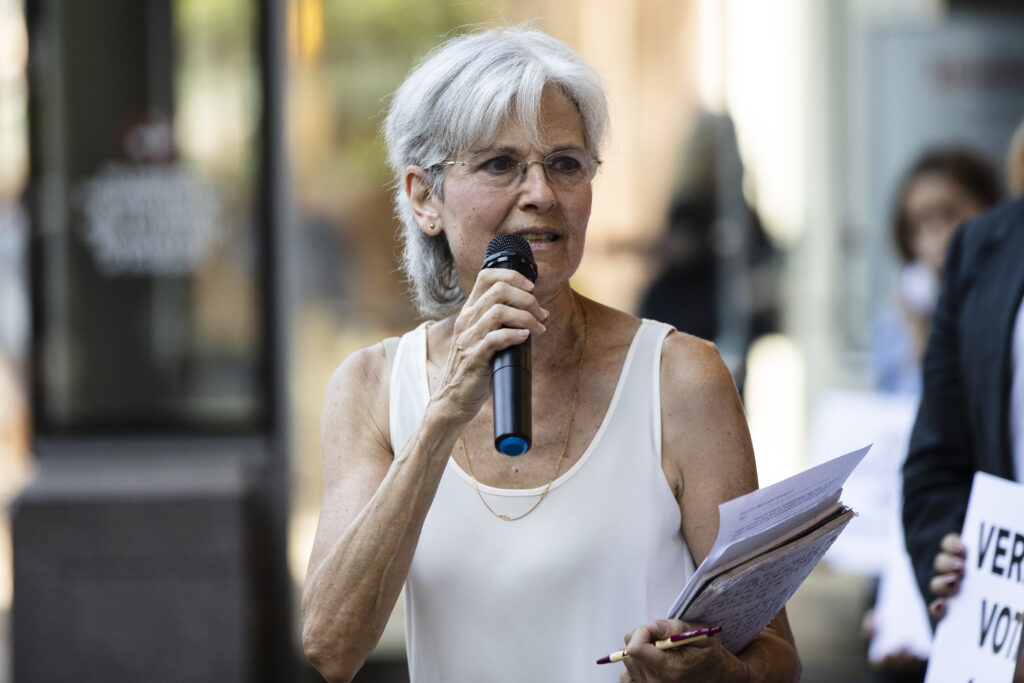
TD: Is there a betrayal that sticks out from your years as an activist in your home state of Massachusetts?
JS: We got money out of politics in Massachusetts. We passed Clean Elections, which required public funding of elections, and it was betrayed by Democrats on a voice vote. They repealed it after it passed a voter referendum two-to-one. That was the last straw for me. I decided this has to be a political battle. I was recruited to run for office having no idea what I was getting into. That’s true for lots of greens.
In my first campaign, for governor of Massachusetts in 2002, we fought our way into a televised debate where I put forward health care as a human right, free public higher education, demilitarization, green jobs, et cetera. It went over like a lead balloon inside the debate studio. But when I walked out of the studio, I was mobbed by the press. An instant online viewer poll showed I won the night. That was the last time I was allowed into a televised debate.
TD: Let’s talk about something in the Green platform that would be very difficult to address in a televised debate, even if you were given the opportunity. This is Section 5a of the Economic Justice and Sustainability section, which recognizes there is “a fundamental conflict between economic growth and environmental protection.” This is a significant break not only with bipartisan consensus, but with most of the U.S. left, which shares a paradigm focused on ever-increasing production and consumption as measured by gross domestic product, despite evidence that growth is an ecological poison pill that can never be “greened.” How do you even begin to have this conversation with normal people worried about making rent and putting food on the table?
JS: This is a very challenging conversation. The limits of growth need to be addressed. It is not a case that we have to shut down growth immediately. But I would say that people get very attached to material comforts as a way to make up for communities and relationships. It’s why fixing our democracy and fixing [the planet] have to go forward together. We’re going to learn a lot in the next couple of years as the climate really hits the fan with drought, food supply, and especially, sea level rise. The Thwaites Glacier is losing its shelf, which acts as a break on two feet worth of sea level rise. It’s important that we be honest about what’s happening, so that we can make informed decisions as a society.
The American people are asking for someone who’s not a creature of Wall Street and in the war machine. If you’re looking for that, we’re likely to be the only option.
Most people don’t even know that we are at the precipice of some very staggering impacts. The Colorado River is about to shut down — whether it’s a year or five years — and that river supplies the water for California agriculture, which supplies half the fruits and vegetables for the country. And let’s be clear, the Democrats are creating a boondoggle for green industries that is not going to help the climate problem. You can say, well, it lays the groundwork for being able to pull back on fossil fuels, and that’s true. But we need to come clean and have an honest conversation about what’s actually going on right now. The Inflation Reduction Act is a fossil fuels first act. It’s a nuclear power act. That’s where we have to begin. And from there, things become possible. People do not trust the climate movement. They can smell a rat. And I don’t mean the grassroots climate movement, the frontline communities. I mean Bill Gates, the World Economic Forum, the high rolling, politically correct types with Teslas and private jets.
TD: A lot of people focus on the Green party once every four years, only to excoriate it. But the party is active in local elections and the work is year-round. What goes on at the local and state levels when most people aren’t paying attention?
JS: We’ve run thousands of candidates at the local level. I think we’ve elected 128 officials. There’s a fairly high rate of success for local Green candidates. They don’t get covered much, but they’re there. Mayors. State legislators. In Massachusetts, we have Greens chairing their municipal select boards, their library boards. We just elected an Afro-Latinx immigrant to the school committee in Holyoke, Massachusetts, which is a very poor community. We have local officials working on land-use planning, fighting for rent control — the whole spectrum of grassroots democracy at the community level. We work to expand these efforts [while] constantly fighting on a tilted playing field. We face smear campaigns and get locked out of the press. We are the guys that their COINTELPRO type programs have not been able to eliminate. Most independent third parties in this country don’t last 10 years. The Peace and Freedom Party is probably one of the most long-lasting, they were established sometime in the ’60s —
TD: Eldridge Cleaver headed their first ticket in ’68, I think.
JS: Right — and they grew from there into a national presence. At one point, they had access to ballots in 15 or 20 states. Now they live in one state: California. They’ve been beaten back. Around the same time the Greens were established, the brilliant labor activist Tony Mazaki, who was also an environmental health and occupational justice guy, established the Labor Party. They had money and an institutional base, but they folded because they could never get past the “spoiler” issue. So, they died. We’re all vilified for being spoilers. Even though the actual spoilers are the parties themselves who fail to really compete and fight for their base, which is why their base is walking away. That’s the problem, not progressives running for office. But that’s the way the public mythology goes. So, we’re vilified constantly in the press or locked out.
TD: What’s changed between the first Green ticket in 1996 and 2024?
JS: What’s different is we’ve got a lot more unhappy campers. People are done being thrown under the bus. Half of renters are paying 30% or more for housing. In some places like New York City, the average rent is 68% of the average income. People are swamped in debt. We are in a political rebellion, and Greens are perfectly positioned right now to support this rebellion. I have found very few people, no matter where they are on the political spectrum, who have not had a complete loss of faith in our political institutions, in the parties of war and Wall Street. We’re in an incredible learning moment right now. For us to proceed with a really honest conversation has enormous potential to help us come together.
TD: Last question. Do you have capsule opinions on your fellow “spoilers” in 2024?
JS: I will just say that I greatly sympathize with the plight of people fighting within the Democratic Party, but it’s hard to have a revolution inside of a counter revolutionary party. For those trying to do this outside of the Democratic Party, it’s difficult to get on ballots, even if you have money. As for the Libertarian Party and No Labels, they take corporate money and may be able to buy their way onto ballots, but that’s not who the American people are asking for.
The American people are asking for someone who’s not a creature of Wall Street and in the war machine. If you’re looking for that, we’re likely to be the only option. What compelled me to run was not only to ensure our ballot access would not go to waste, but also because it was highly likely the Green candidate would be the only pro-worker, anti-war, climate-action option. Either we were going to provide that, or it wasn’t going to be there. It was just unconscionable to me, to us, not to [provide] that at a time when the ship is going down. I know there are a lot of people who don’t understand why I’m running. But if you understand the life and death importance of fighting back against the existential crises we face, you know we can’t put this on the shelf. We have to do it now. That’s why I’m running.
Your support matters…Independent journalism is under threat and overshadowed by heavily funded mainstream media.
You can help level the playing field. Become a member.
Your tax-deductible contribution keeps us digging beneath the headlines to give you thought-provoking, investigative reporting and analysis that unearths what's really happening- without compromise.
Give today to support our courageous, independent journalists.


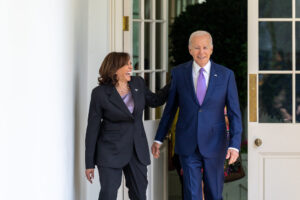


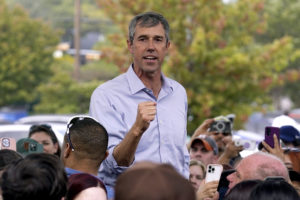
Zaitchik says "Stein’s 2012 campaign was regarded as a nonfactor in Barack Obama’s reelection and largely ignored by the Democratic establishment. Her 2016 campaign drew considerably more attention — and ire — when she amassed vote totals in Pennsylvania, Wisconsin and Michigan that were larger than Donald Trump’s slim margins over Hillary Clinton. The three states did not equal enough electoral votes to swing the election" Not true, the three states in question add up...
Zaitchik says "Stein’s 2012 campaign was regarded as a nonfactor in Barack Obama’s reelection and largely ignored by the Democratic establishment. Her 2016 campaign drew considerably more attention — and ire — when she amassed vote totals in Pennsylvania, Wisconsin and Michigan that were larger than Donald Trump’s slim margins over Hillary Clinton. The three states did not equal enough electoral votes to swing the election" Not true, the three states in question add up to 48 Electoral Votes (EV), enough to swing the election, noting Clinton's total was 232 TVs, giving her more than 270 TVs.
Hip Hip Hooray, Yippee!
How just get Nader, Chris Hedges, and more such people on board!
West is nice, but I fear he is just too dog ugly to win!
Forgot Chomsky.
Truthdig!
what the hell
You just dug your own grave, and won't be getting any donations from this family. Jill Stein is a self-serving anti-progressive. "Tell us what you really think? I just did." I don't give two hoots about anything Miss Thing has to say.
"But what do the Democrats do? They fight-rank choice voting to the nail. "
And what have you done year after year when I go to you to help me get rank choice voting in Florida? Absolutely NOTHING!!!
What a bunch of hypocrites!